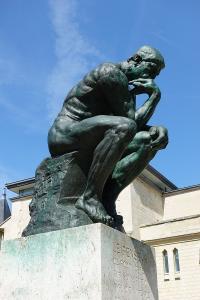What Good Education Does
As most readers here will already know, I was (and am still to some extend) involved in post-high school education for many years. I entered college in 1970, seminary in 1975, university in 1978. I earned two master’s degrees and a doctoral degree and studied in Germany. I began my teaching career at a Christian university in 1982, continued at a Christian liberal arts college in 1984, and became a tenured, full professor at a Christian university in 1999. I held a named and endowed chair in Christian ethics and taught Christian theology and still do. I hold the title of Emeritus Professor in retirement.
My family called me a “professional student,” up until I finally (!) received my Ph.D. One close family member told me to beware of becoming an “over educated idiot.”
Looking back on all that education, really including high school (I graduated from a fine high school), I ask myself what it did for me beyond learning a bunch of information. Simply put, it transformed me. Good education transforms a person, at least a person who really takes it in and allows it to change him or her.
How does good education transform a person—beyond filling his or her head with “facts?” Well, I believe filling one’s head with facts or ideas is really NOT the main value of education.
So what is the main value of good education? What makes education good?
Good education forms a person into a critical thinker. That doesn’t mean a chronic skeptic! A critical thinker is someone who knows how to examine an idea by its history, context and coherence—coherence with other, more grounded ideas and inner coherence as logical consistency. A critical thinker learns to step back from ideas put before him or her and ask questions, even the right questions. A critical thinker is slow to embrace any idea until it is examined. And examining an idea requires a certain “distance” from it.
A good education is different from indoctrination. It must encourage that “distance” from all ideas that is required for critical thinking. It teaches how to examine ideas critically, how to conduct research, how to read, how to research, how to think. A good education inculcates historical consciousness, the ability to rise above the immediate idea pressing upon and ask and discover the historical context out of which it arose. Where did it come from? Why do people believe it? What is its history, its background? What are its strengths and weaknesses? What do many reasonable people think about it? What has been said about it by scholars?
Another way of saying all this is that good education is different from indoctrination and by “indoctrination” I mean ANY pressure from educators to believe things without giving inter-subjective reasons. When I pressed my Bible college professors to tell me why I should believe a particular doctrine the final answer given was “If we didn’t believe it we wouldn’t be….” Following the “be” was the name of our particular Christian tradition.
Good education inculcates in the student a certain degree of skepticism toward every idea. The educated person asks “Why?” “Why should I believe that?” And pushes back against pressure and asks for good reasons.
Unfortunately, much of today’s Western education is infected with indoctrination. Some honest and sincere questions are excluded or treated with shaming and even mental and psychological abuse.
So what have I done as a professor? I have always told my students that there are no stupid or unwelcome questions that are asked honestly. And if my answer, should I have one, is not reasonable, keep seeking an answer, even elsewhere. Think for yourself. “Sapere aude!” That is not just a cliche from Immanuel Kant; it is the rule of all rational thought and should be inscribed over the entrance to every educational institution at least from high school on.
Of course, that means an educated person, a person who has “latched onto good education,” will inevitably suffer because MOST people either have not experience good education or have chosen not to benefit from it. They will inevitably attack the well-educated person for daring to question what they believe that is stupid, uninformed, embraced without thought. The well-educated person will inevitably be tempted to retreat into a realm of other well-educated persons.
Do I know of what I write? Absolutely. Most of my life I have been surrounded by mostly well-intentioned, good people (of good character) who are not educated and don’t respect me even when I speak about matters I have studied and research thoroughly. Many times I have been told that I have been brainwashed by “the academy,” meaning by my educators and colleagues. Rarely have people I know very well actually shown respect for my education. That is the burden well-educated people bear in this highly, strongly anti-intellectual society where “experts” with little or no education are respected while “scholars” are not.
The life of the well-educated person is often lonely. Insofar as he or she moves about in circles populated by uneducated or poorly educated people, he or she will have to hide his or her educated self. He or she will have to set aside his or her good grammar, strong vocabulary, knowledge and critical thinking skills.
Finally, one of the things good education does for a person that doesn’t come naturally is to be able to make subtle distinctions between things that appear on the surface to be the same but are not. I will just choose one example here. I could give many. I know, as a religion scholar, that “Reformed” and “Calvinist” are not identical categories. And yet, among American conservative evangelicals the two words are used interchangeably. Now, many will say “Why does it matter?” It matters because many Protestant Christians who are clearly Reformed are not Calvinists. Calvinism is one expression of Reformed theology, but not the only one.
Again, I could give so, so many examples. The words “conservative” and “liberal” are widely abused in common conversations, even by people who should know better (e.g., talking heads in the mass news media). But I will stop here.
Good education is rare. I was blessed to receive it in at least some of the institutions where I studied. Once I figured out what it was, sometime during my seminary years, I realized I had received it during my three years of high school and not during my four years of college—although I instinctively knew what it was and went out of my way, even out on a limb, to find it on my own through reading. I received it during my seminary years, especially when I stepped out of the confines of the seminary and took seminars at a local university. I finally really received it during my several years of doctoral studies at a major secular research university and at a university in Germany.
Because of it I have always shied away from indoctrination although I do not hide my beliefs from students and encourage them to agree with me insofar as they are truly persuaded by my reasoning. Many of them were not and that’s okay.
*If you choose to comment, make sure your comment is relatively brief (no more than 100 words), on topic, addressed to me, civil and respectful (not hostile or argumentative), and devoid of pictures or links.*














